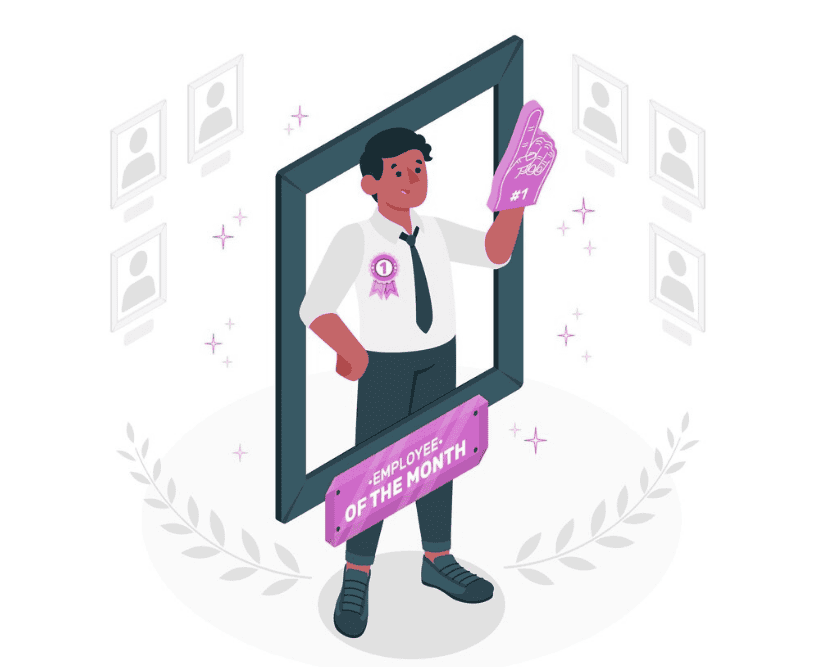Employee recognition programs are valuable tools for businesses to engage and motivate their employees. These programs range from simple thank-you notes or public praise to formal award ceremonies and monetary incentives.
Table of Contents
While some may see employee recognition programs as unnecessary or costly, the truth is that employee recognition can significantly impact a business's success.

What Is an Employee Recognition Program and How Do They Work?
An Employee Recognition Program is a strategic tool used by organizations to appreciate and reward their employees for excellent work, achievements, and positive behavior. These programs aim to cultivate a supportive atmosphere, elevate morale, and increase employee engagement.
At their core, employee recognition initiatives employ various methods to show appreciation, including days off, monetary bonuses, public acknowledgment, gift cards, or access to a social recognition platform.

The efficacy of these recognition programs is underpinned by neuroscience. Ideally, dopamine, a neurotransmitter released in the brain during rewarding experiences, encourages a cycle of positive behavior, prompting employees to feel a surge of satisfaction and enjoyment from recognition.
This biochemical response not only motivates but also promotes a pattern of continued positive contributions.
Benefits of Employee Recognition Programs for Businesses
Implementing an employee recognition plan can profoundly impact a business, primarily by boosting productivity. When employees feel valued and recognized, they're more likely to put in effort, leading to increased efficiency and output.
This heightened sense of worth also significantly reduces employee turnover. Happy and appreciated employees are less likely to leave, saving the company extensive costs associated with hiring and training new staff.
Additionally, employee morale receives a notable lift through regular recognition. This boost in morale doesn't just benefit individual employees; it permeates the team, leading to an improved team culture.

Types of Employee Recognition Programs
Employee Recognition Programs come in various forms, each designed to meet diverse organizational needs and employee preferences. Understanding the types available helps businesses tailor their approach to effectively appreciate and motivate their workforce.
Peer-to-Peer Recognition Programs
These programs empower employees to recognize their colleagues for their hard work and contributions. This approach fosters a culture of appreciation across all levels of an organization and encourages teamwork.
Performance-Based Recognition Programs
Performance-based programs reward employees for meeting or exceeding specific goals. This can include sales targets, project completions, or other measurable outcomes, often accompanied by bonuses, awards, or public acknowledgment.
Service Milestone Recognition
Service milestone programs celebrate work anniversaries or long-term commitments and acknowledge employees' loyalty and dedication. Recognitions include awards, gifts, or publicly recognizing an employee's years of service during company meetings.
Spot Recognition Programs
Designed for immediate acknowledgment of noteworthy efforts or achievements, spot recognition programs allow managers to give on-the-spot rewards or thank-yous for exceptional work, reinforcing positive behaviors in real-time.
Employee of the Month/Quarter/Year Programs
These traditional programs highlight an individual's contribution over a set period. Winners might receive a variety of rewards, from monetary bonuses to prime parking spots, alongside public recognition.

How to Implement an Effective Employee Recognition Program
To implement an effective employee recognition plan, businesses must take a strategic, thoughtful approach that aligns with their culture and objectives. This process involves several key steps:
1. Define Clear Objectives
Before launching a recognition program, it’s crucial to identify what you aim to achieve. Whether it’s increasing employee engagement, reducing turnover, or boosting productivity, having clear goals will help shape the program’s structure and measure its success.
2. Understand Employee Preferences
Recognition programs are most effective when they resonate with the recipients. Conduct surveys or interviews to understand what forms of recognition your employees value most, be it public acknowledgment, financial incentives, or professional development opportunities.
3. Determine Program Types
Choose the types of recognition programs that best suit your organization based on your objectives and employee feedback. You may opt for a combination of programs, such as peer-to-peer and performance-based recognitions, to cater to diverse preferences and achieve multiple goals.
4. Establish Criteria and Guidelines
To ensure fairness and transparency, clearly outline the criteria for recognition and the process for selecting recipients. This helps maintain the program's integrity and ensures that all employees feel they have an equitable opportunity to be recognized.
5. Communicate the Program
Effectively communicate the details of the recognition program to all employees, ensuring they understand how it works, how to participate, and what the rewards are. Regular communication about the program can keep it top-of-mind and encourage ongoing participation.
6. Train Managers
Ensure managers are trained on the importance of recognition and how to effectively use the program. This includes giving meaningful recognition, understanding the types of rewards available, and how to incorporate recognition into regular interactions with their teams.
Employee Recognition Program FAQs
How often should employee recognition programs be evaluated for effectiveness?
Evaluate employee recognition plans at least annually to ensure they align with company objectives and employee satisfaction, adjusting them based on feedback and performance metrics.
Can small businesses implement comprehensive recognition programs effectively?
Absolutely. Small businesses can tailor recognition programs to fit their size and budget, focusing on meaningful, personalized recognitions that resonate with their team’s values and culture.
Are non-monetary recognitions as effective as monetary ones?
Non-monetary recognition can be equally, if not more, effective than monetary ones, especially when they are personalized, sincere, and aligned with the individual’s values and desires.
How do we ensure fairness in employee recognition plans?
Establish clear, objective criteria for recognitions, ensure all employees understand how to participate, and train managers to recognize consistently and impartially across all teams.
The Key to Effective Employee Recognition Program
Effective employee recognition plans foster a positive workplace culture and drive organizational success. Companies can significantly enhance engagement, productivity, and loyalty by strategically selecting, implementing, and regularly reviewing programs tailored to employee preferences and business objectives.
Ultimately, the key to a successful recognition program lies in its flexibility, inclusivity, and alignment with the organization's overarching goals.


